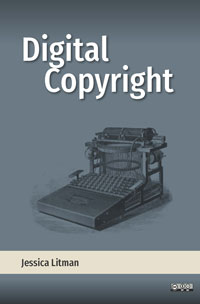
Digital Copyright
Skip other details (including permanent urls, DOI, citation information): This work is licensed under a Creative Commons Attribution-NoDerivatives 4.0 International License. Please contact mpub-help@umich.edu to use this work in a way not covered by the license.
For more information, read Michigan Publishing's access and usage policy.
Author’s Note
I finished the original manuscript of Digital Copyright in 2000, two years after Congress enacted the Digital Millennium Copyright Act. The 1976 Copyright Act was itself 24 years old, and beginning to show its age. The Internet, in contrast, was still new and shiny and scary, especially for legacy entertainment and information businesses and the copyright lawyers who represented them.
Seventeen years later, the Internet has become an essential feature of all of our lives and the copyright laws designed to tame it seem elderly and barnacle-encrusted. Remarkably, the legislative process that has made sensible copyright law reform all but impossible has stayed largely unchanged. Congress and the Copyright Office have recently launched what is billed as a comprehensive reexamination of copyright law with the goal of overhauling the law for the 21st century. It seems likely that these efforts will hew to the patterns of earlier copyright revision.
Perhaps we stick with the tried and true approach to making copyright laws, even though it results in bad laws, because the process works so well for so many of the participants. Members of Congress can rely on affected industries to come up with broadly acceptable compromises, and to take on much of the burden of pressuring other interested groups to swallow them. Meanwhile, Senators and Representatives can continue to collect generous campaign contributions. The Copyright Office can be the center of attention as it plays a crucial role in managing the multilateral negotiations and interpreting their results to Congress. Copyright lobbyists and trade organizations can collect hefty fees from their members, in return for supplying them with laws that will give them competitive advantages against the next new thing, whatever it is. Because the laws that emerge from this process don’t work very well, meanwhile, everyone can look forward to another round.
Although this book is ancient in Internet time, people seem to have continued to read it. Now that it has finally gone out of print, I’m delighted to be able to make it more freely available under a Creative Commons license. In addition to the Afterword that I wrote for the 2006 paperback edition, I have included a postscript looking back briefly on what, if anything, we might have learned from the aftermath of the stories told in this book.
I want to express my gratitude to Prometheus Books for graciously returning the rights to this book when I asked for them back; to the Authors Alliance for advice on how to reclaim the rights and release the book under a Creative Commons license; to Jason Colman, Director of Michigan Publishing Services, for taking on the project; to the William W. Cook Trust, for helping to pay for it; and to Jonathan Weinberg, for perceptive critique, gentle copy-editing, and more than thirty years of intellectual and emotional support. I love you Jon.


